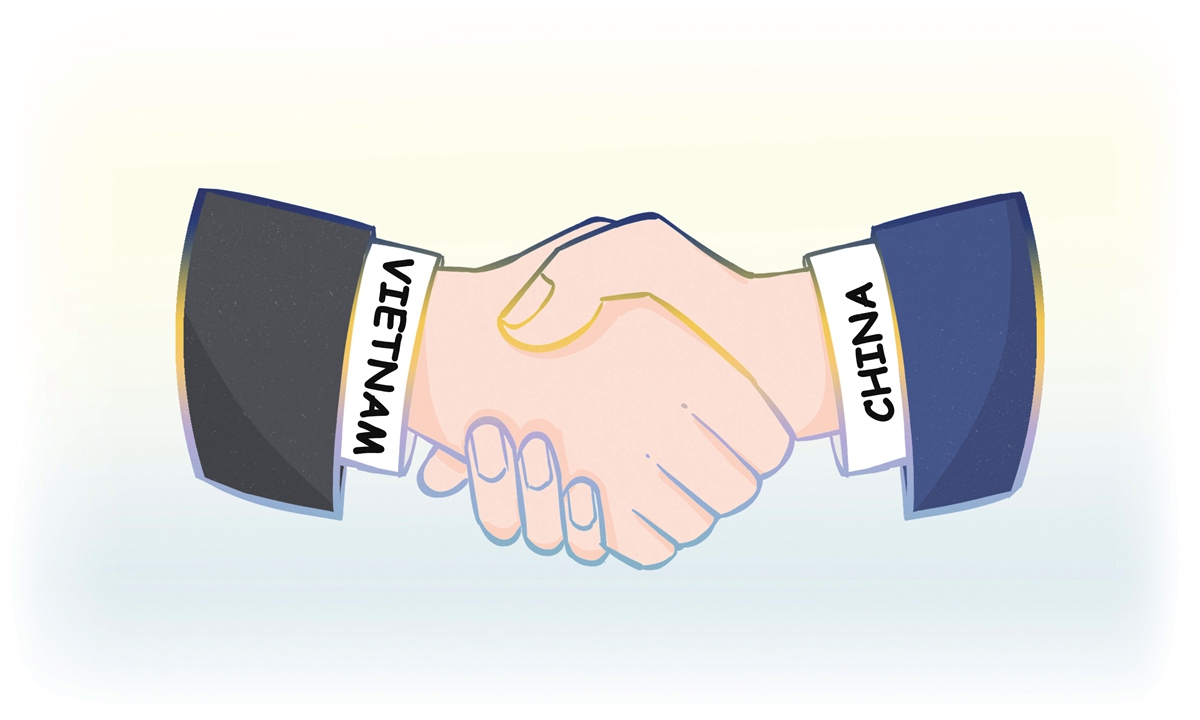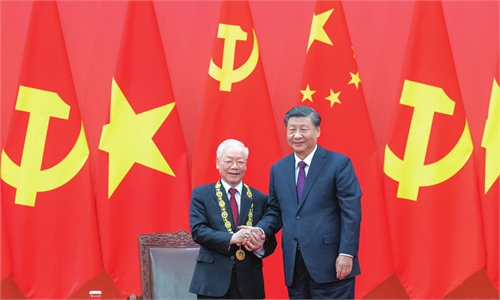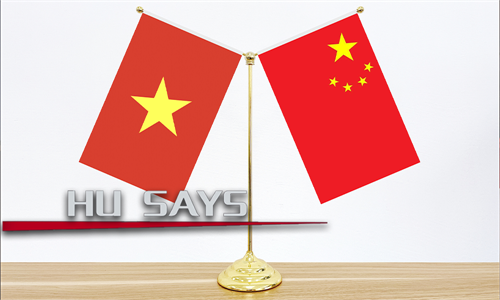
Illustration: Chen Xia/GT
As General Secretary of the Communist Party of Vietnam (CPV) Central Committee Nguyen Phu Trong concluded his China visit on Wednesday, relations between CPV and the Communist Party of China (CPC), as well as between the two countries, have proven to be resilient once again.During his visit, Trong was awarded the Friendship Medal of the People's Republic of China on Monday, becoming the 10th foreign individual to receive this honor. As China's highest order of honor for foreigners, the Friendship Medal is a recognition of Trong's efforts to further develop China-Vietnam relations under the continuation of the two countries' traditional friendship.
The medal represents the friendly feelings of the CPC and the Chinese people toward Trong and the Vietnamese people, symbolizes the profound friendship between China and Vietnam as "comrades and brothers," and embodies the ardent hope of the two parties and the two peoples for a better future together, said Xi Jinping, general secretary of the CPC Central Committee and Chinese president, who presented the medal to Trong.
Currently, geopolitical competition among major powers is increasingly intensifying. Since the outbreak of the Russia-Ukraine conflict, antagonistic sentiment has flooded in the international public opinion arena. Under such circumstances, Southeast Asian countries, including Vietnam, are under pressure.
Trong clearly stated in his trip to China that his country will not allow any other state to establish a military base in Vietnam, not join any military alliance, not use force against any country, and not work with one country to oppose another. This goes in line with the longstanding position of non-alignment that Vietnam has always advocated, which is also the current position of most ASEAN members.
In August 2021, US Vice President Kamala Harris paid a visit to Vietnam, attempting to rope the Southeast Asian nation into US' anti-China bloc. On the same day Harris landed in Hanoi, Vietnamese Prime Minister Pham Minh Chinh told Chinese Ambassador Xiong Bo in a meeting that his country won't ally with one country to oppose the other. He also wished for the two countries to promote exchanges at all levels and boost comprehensive cooperation.
Indo-Pacific regional countries, such as the US and Japan, are paying close attention to Vietnam's role in the region. They try to exert their influence on China-Vietnam relations through persuasion and even attempting to drive a wedge. This is manifested particularly in the South China Sea (SCS) issue. For instance, in recent years, some countries have been hyping the case of foreign ships docking at Vietnam's Cam Ranh Bay.
In fact, regarding the SCS issue, all parties concerned have been working on further consultations on the Code of Conduct in the SCS. In a joint statement released on Tuesday, the two countries also made it clear that they agreed to continue to promote the full and effective implementation of the Declaration on the Conduct of Parties in the SCS.
Establishing rules and regulations in the SCS and the effective governance of disputes are the matter of the regional countries. Peace and stability in the SCS are essential prerequisites for regional development, and a proper solution will have a profound significance for future development.
No matter how hard Washington tries to pull Hanoi into its orbit, there is an upper limit to their relations. While the two have gradually deepened cooperation at the political, economic, and security levels in recent years, China and Vietnam have also conducted joint patrols in the Gulf of Tonkin and held exchange activities on border defense.
Apparently, Vietnam firmly upholds its position of putting its interests first, and joining the US Indo-Pacific Strategy and becoming an important player in its containment of China is against that.
In addition, Hanoi is unlikely to get too close to Washington due to differences in ideology. As a communist-ruled country, Vietnam faces the risk of US intervention in the form of "color revolutions." Political party Viet Tan, defined by the Vietnamese government as a terrorist organization, is still quite active in the US. And Trong has become increasingly wary of the dangers at home.
On the other hand, China and Vietnam have a historical tradition of bilateral exchanges. As socialist, developing countries that share borders, they share many similarities, even similar problems in development. This lays a realistic foundation for the governing exchanges and communication between them.
At the trade level, both sides face the same challenges of anti-globalization and trade protectionism. Vietnam is becoming a more important player in the region's value chain and division of labor, while China is the largest economy in Asia with a relatively mature industry chain.
Vietnam is China's biggest trading partner in Southeast Asia, so strengthening the economic cooperation between China and Vietnam will benefit the two countries. But what's more, their cooperation can build an independent, mature, and stable industrial chain and division of labor in the value chain in Southeast Asia.
The article was compiled by Global Times reporter Liu Zixuan based on an interview with Ge Hongliang, director of the China-ASEAN Maritime Security Research Center at Guangxi University for Nationalities. opinion@globaltimes.com.cn


